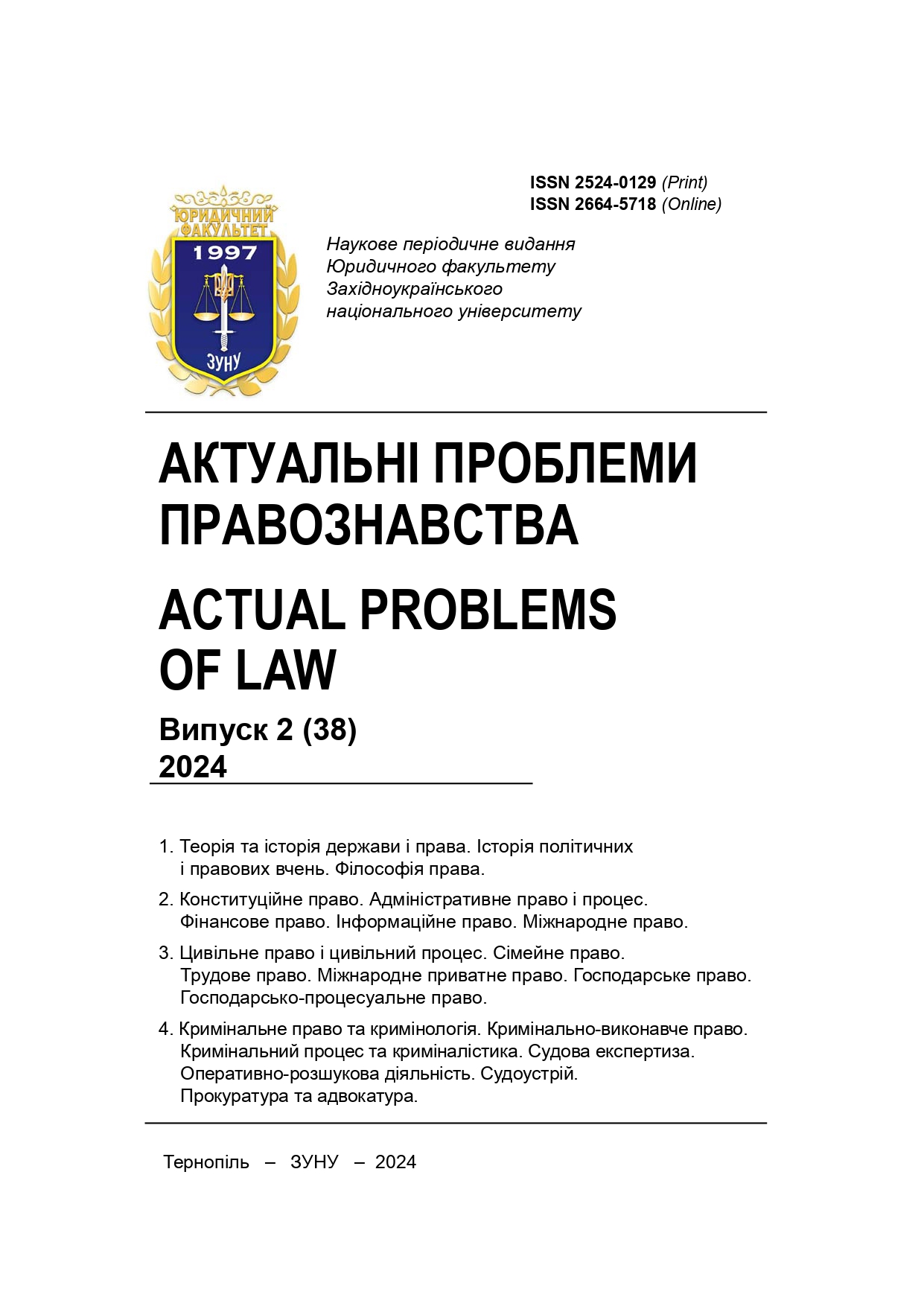Prospects of using the artificial intelligence technologies in jurisprudence and law enforcement
DOI:
https://doi.org/10.35774/app2024.02.090Keywords:
artificial intelligence, jurisprudence, law enforcement, securityAbstract
This article examines the main advantages of artificial intelligence technologies using in jurisprudence and law enforcement. The purpose of this article is an attempt to formulate the prospects for the use of artificial intelligence technologies in jurisprudence and law enforcement. The authors identify the threats and formulate the prospects for the use of AI in jurisprudence and law enforcement. The relevance of this research is, accordingly, explained by the need to conduct a comparative organizational and legal analysis of the liability of manufacturers/developers of software based on AI technologies and lawyers and law enforcement officers in case of an error or wrong decision in the process of using AI in their professional activities.
As a result of the study, the authors reviewed the services that optimize access to and analysis of legislation and judicial practice, noted the results of the assessment of the global market for artificial intelligence software, formulated a number of advantages of using artificial intelligence technologies in jurisprudence and law enforcement, identified the main areas of diversification of the areas of application of AI technologies that are related to the ones under study, proposed solutions in the situation of inconsistency of AI forecasts, and formulated a
The article emphasizes the need to adopt changes and improve the qualifications of employees in the field of law and law enforcement. The authors come to the conclusion that the use of artificial intelligence in legal and law enforcement practice opens up new opportunities, but may also be subject to relevant threats. Therefore, when using AI technologies, lawyers, for example, should adhere to the principles of data privacy and security, and law enforcement officers will need to introduce new training to be able to successfully adapt to this new environment.
Downloads
References
1. Androshchuk, H. (2021). Shtuchnyi intelekt: ekonomika, intelektualna vlasnist, zahrozy Artificial intelligence: economics, intellectual property, threats. Teoriia i praktyka intelektualnoi vlasnosti - Theory and practice of intellectual property, 56-74 [in Ukrainian]. https://doi.org/10.33731/32021.239583
2. Barbashyn, S. (2023). Shtuchnyi intelekt: problemy ta perspektyvy pravovoho rehuliuvannia v Ukraini ta YeS [Artificial intelligence: problems and prospects of legal regulation in Ukraine and the EU]. Pravo Ukrainy – Law of Ukraine. Retrieved from https://pravo.ua/shtuchnyi-intelekt-problemy-ta-perspektyvy-pravovoho-rehuliuvannia-v-ukraini-ta-ies [in Ukrainian]
3. Bohomia, V. I. & Hudz, A. S. (2023). Shtuchnyi intelekt: suchasnyi stan i perspektyvy zastosuvannia [Artificial intelligence: current state and prospects of application]. Modern Information Technologies in the Sphere of Security and Defence, 1(46), 13-17 [in Ukrainian]
4. Kostiuchenko, O. Iu. (2023). Chy zabezpechyt vykorystannia shtuchnoho intelektu u kryminalnomu sudochynstvi bilsh vysokyi riven dotrymannia prav uchasnykiv provadzhennia? [Will the Use of Artificial Intelligence in Criminal Proceedings Ensure a Higher Level of Respect for the Rights of Participants in Proceedings?] Tekhnolohii dobrochesnoho vykorystannia shtuchnoho intelektu u sferi osvity ta nauky : materialy vseukrainskoho naukovo- pedahohichnoho pidvyshchennia kvalifikatsii - Technologies for the fair use of artificial intelligence in the field of education and science: materials of the all-Ukrainian scientific and pedagogical advanced training, 31 lypnia – 10 veresnia 2023 roku. Odesa : Vydavnychyi dim «Helvetyka», 134-136 [in Ukrainian]
5. Kotsko, T. A. (2023). Bezpekovi aspekty rozvytku tekhnolohii shtuchnoho intelektu [Security aspects of the development of artificial intelligence technologie]. Tekhnolohii dobrochesnoho vykorystannia shtuchnoho intelektu u sferi osvity ta nauky : materialy vseukrainskoho naukovo-pedahohichnoho pidvyshchennia kvalifikatsii - Technologies for the fair use of artificial intelligence in the field of education and science: materials of the all-Ukrainian scientific and pedagogical advanced training, 31 lypnia – 10 veresnia 2023 roku. Odesa : Vydavnychyi dim «Helvetyka», 2023. S. 138-142 [in Ukrainian]
6. Perspektyvy ta mezhi vykorystannia shtuchnoho intelektu v kryminalnomu protsesi [Prospects and Limits of Using Artificial Intelligence in Criminal Proceedings] (2024). FAMA. AGENCY [in Ukrainian]
7. Muravska Yu. Shtuchnyi intelekt yak element intelektualnoi bezpeky: mizhnarodno-pravovyi aspekt [Artificial intelligence as an element of intellectual security: international legal aspect]. Pravove rehuliuvannia tsyfrovoi ekonomiky ta shtuchnoho intelektu: natsionalnyi ta mizhnarodnyi vymiry: materialy mizhnarodnoi naukovo-praktychnoi konferentsii - Legal regulation of the digital economy and artificial intelligence: national and international dimensions: materials of the international scientific and practical conference. 16 lystopada 2023 r. Kyiv: Interservis, 172-175 [in Ukrainian]
8. Rassel, S. & Norvih, P. (2021). Shtuchnyi intelekt. Suchasnyi pidkhid [Artificial intelligence. A modern approach]. T. 1. Rishennia problem: znannia i mirkuvannia - Problem solving: knowledge and reasoning. Viliams [in Ukrainian]
9. Tymoshenko, Ye. A. (2020). Shtuchnyi intelekt yak subiekt prava intelektualnoi vlasnosti [Artificial Intelligence as a Subject of Intellectual Property Rights]. Problemy prava intelektualnoi vlasnosti - Problems of intellectual property law, 328-332 [in Ukrainian]
10. Artificial Intelligence in Law Industry: Key Trends. Intellisoft. 2023. Retrieved from https://intellisoft.io/artificial-intelligence-ai-in-the-law-industry-key-trends-examples-usages [in English]
11. Artificial Intelligence – Worldwide. Statista. 2024. Retrieved from https://www.statista.com/outlook/tmo/artificial-intelligence/worldwide [in English]
12. Generative AI could raise global GDP by 7 %. Goldman Sachs. 2023. Retrieved from https://www.goldmansachs.com/intelligence/pages/generative-ai-could-raise-global-gdp-by-7-percent.html [in English]
13. Law Bots: How AI Is Reshaping the Legal Profession. American BAR Association. Business Law Today. 2022. Retrieved from https://businesslawtoday.org/2022/02/how-ai-is-reshaping-legal-profession [in English]
14. Villasenor, J. How AI will revolutionize the practice of law. Brookings. Retrieved from: https://www.brookings.edu/articles/how-ai-will-revolutionize-the-practice-of-law [in English]
15. Yara, O., Brazheyev, A., Golovko, L. & Bashkatova, V. (2021). Legal Regulation of the Use of Artificial Intelligence: Problems and Development Prospects. European Journal of Sustainable Development, 10, 1, 281-289 [in English] https://doi.org/10.14207/ejsd.2021.v10n1p281
Downloads
Published
Issue
Section
License

This work is licensed under a Creative Commons Attribution-NonCommercial 4.0 International License.





